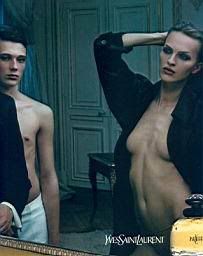 Sophia Grojsman, the renowned perfumer behind this, is no shy violet when coming to streamlining a formula down to a few core accords & ingredients which give a pronounced effect: Tonalide and Galaxolide (both synthetic musks) are also overdosed, and her other best-selling opus, Trésor for Lancôme, contains a huge amount of Galaxolide, accounting for the phenomenal tenacity (Synthetic musks don't budge off for days on end).
Sophia Grojsman, the renowned perfumer behind this, is no shy violet when coming to streamlining a formula down to a few core accords & ingredients which give a pronounced effect: Tonalide and Galaxolide (both synthetic musks) are also overdosed, and her other best-selling opus, Trésor for Lancôme, contains a huge amount of Galaxolide, accounting for the phenomenal tenacity (Synthetic musks don't budge off for days on end).Calvin Klein wanted to capture a romantic vibe after the carnal lust of Obsession and its racy advertising, forseeing the 1990s return to the cocoon and the conservative values of family. Thus an iconic fragrance of the 1990s emerged, advertised in serene scenes of a family by the sea, fronted by Chris Turlington (one of the top 5 supermodels of the era). Was the seascape kissing romantic in that it stirred the unconsious of viewers into reminding them of Deborrah Kerr and Burt Lancaster sharing a passionate salty kiss in From Here to Eternity? Possibly. But the execution was much tamer this time, all preppy and "clean", in tune with the AIDS epidemic which necessitated a (public) cleaning up of one's sexual act.
 The name was inspired by the ring of the Windsors, which king Edward VIII had offered to Wallis Simpson, and which Calvin had later bought at an auction for his ~then~ wife Kelly Proctor; it stands as a token of timeless promise of love and immortality: "As long as we're together, time can't touch us" the motto went.
The name was inspired by the ring of the Windsors, which king Edward VIII had offered to Wallis Simpson, and which Calvin had later bought at an auction for his ~then~ wife Kelly Proctor; it stands as a token of timeless promise of love and immortality: "As long as we're together, time can't touch us" the motto went.The characteristic peppery heart of Calvin Klein Eternity evoking carnations is dusted with powder (heliotrope, musk) and fresh notes (citrus, greens, lily of the valley), making the fragrance fit for summer or winter, as long as you use it with restraint; it's quite potent! But the overall impression is removed from individual notes: Luca Turin calls it a "loud rose" and he's absolutely right: Eternity takes peppery notes reminiscent of spicy flowers (like carnation) and sprinkles them on top of an intensely soapy rose. In short, if you expect something like the retro Bellodgia by Caron, you will be disappointed.
To really feel the rose beneath the carnation however do an experiment: Take rose-affirmed Paris by YSL (also by Grojsman) and spray one on the one hand, the other on the other. You will feel it all right! After all, rose is Grojsman's favourite flower and she manages to amplify its message in almost everything she touches creating that "cleavage" accord for which she's famous, from Trésor for Lancôme (allied with apricot), Bulgari pour Femme, Nude by Bill Blass, and Jaipur for Boucheron to uber-niche S-perfume 100% Love. "Perfumers have signatures," Mrs. Grojsman said. "You can pick up a fragrance and know who the perfumer is by the way certain ingredients are put together. I'm known for floral accords, bottoms and cleavage."
Memorably, one of the lines I best recall involving the fragrance was featured in an American film involving a gynaecologist molester: his preferred scent on his women victims was Eternity; "it smells of clean sheets" was his (valid) explanation. Creepy...
Eternity proved such a popular concept (it's a best-seller in France of all places!) and name that a legion of flankers (Eternity Moment, Eternity Purple Orchid, Eternity Rose Blush, Eternity Summer and some I might be forgetting right now) have emerged over the years, tweaking the formula to serve the zeitgeist. It's still available (and apparently selling well) in department stores under Coty Prestige.
Notes for Calvin Klein Eternity (1988 original)
Top: Freesia, leafy green accord, citrus oils (mandarin), sage, narcissus, lily
Heart: Rose, violet, lily of the valley, carnation, marigold, apricot, peach
Base: Patchouli, sandalwood, heliotrope, musk
.jpg)
.jpg)
.jpg)







